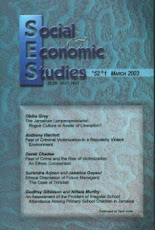Professor of Criminology
Department of Sociology, Psychology & Social Work
University of the West Indies, Mona
“..... Are we likely to see extraordinary increase in crime resulting from the impact of the full-scale economic downturn expected to hit Jamaica in the months and perhaps years ahead?” This was the gist of a question a journalist from the Jamaica news-radio programme “Nationwide”, piecing together his story for a segment of his evening’s broadcast, put to me in a pre-taped interview a few days ago.
Not unlike what generally occurs in the hasty cut and paste that guides production and ultimately presentation of some of the most important stories of our time, much of what I had to say in response to that critical question got butchered and yanked out of context when presented on air. I use here the opportunity to summarise the key points in my answer, maximising the greater clarity that print allows.
One of the many things we fall short on in the academy is the gift of prophecy. We are terribly weak in the area of clairvoyance. Nonetheless, weighing possible future outcomes is indeed part and parcel of what we do, or try to do. Typically what guides us in contemplating the future is knowledge gained from the past. Given that a particular concatenation of forces caused a certain outcome in the past, what is the likelihood that a similar coming together, at some other or future time, will produce the same outcome?
I had put it to the young reporter that it is precisely within this context that his very important question has to be considered. Data and research knowledge guide how we ponder and plan for the future.
What we know
With respect to economic conditions—employment specifically—and crime, what we know unequivocally is that the closer a society gets to full employment, the less crime there is in that society.[1] The United States, in the early 1960s, and again in the mid-1990s, came as close it ever did to full employment (i.e., outside of the period of chattel slavery). These were also years in which the country’s crime numbers were at historic lows.
The converse is not necessarily true however. It does not always follow that severe economic downturns, with huge job losses and massive unemployment, as analysts say Jamaica (and likely also the rest of the Caribbean) is set to experience, will inexorably lead to high or higher crime. In fact, it rarely is the case that a national economic implosion, as in a prolonged depression, led to high crime.
Counterintuitive as it may seem, during the U. S.’s prolonged Great Depression, when rates of unemployment soared in three years from 3 per cent to 25 per cent, and the economy contracted by 30 per cent, casting more than 15 million people out of work, crime shrank, noticeably so in the numbers of youthful crimes.[2] Why this happened is instructive. Sociologists have offered four main explanations from which we may draw, should a similar economic calamity hit the region:
- 1) Where economic pain is more or less equally distributed, where everyone’s made “flat”, as the Great Depression certainly did, at least for a great many in the population, crime tends to remain low.
- 2) Large numbers of parents, relatives and other adults out of work often means more parents, relatives (aunts, uncles, big brothers and big sisters) and other adults staying at home, thereby exerting greater influence and control over potentially errant youthful behaviours.
- 3) Large-scale absence of external economic means of support generally translates into greater reliance on storehouse of indigenous, internal resources (barter, sharing, religion), which then strengthens communities against crime and criminality.
- 4) Dread economic times result in no goods to steal—shops are boarded up; supermarket shelves are empty; fewer fashionably dressed, heavily jewelled people around to mug; no armoured truck transporting huge amounts of cash. There’s simply nothing, and no one, to rob.
Crime is at its most alarming levels under conditions of glaring socioeconomic disparity; when the pain is not evenly distributed or felt; when a rising tide does not lift all boats, or many boats; or when the competition for available goods is fiercest.
Jamaica and the Caribbean needn’t long, though, for an economic depression to cure us of our terrible crime problem. Now just may be the time for the region to begin anew to re-inculcate within national cultures and conversations simple facts about co-existence that periods of massive and prolonged hard times have a forceful and unpleasant way of bringing out.
[1]See, e.g., Raymond Paternoster and Shawn Bushway, “Theoretical and empirical work on the relationship between unemployment and crime”, Journal of Quantitative Criminology 17 (4), 2001: 391-407
[2]See, e.g., Barry Goldson and Janet Jamieson, “Youth crime, the ‘parenting deficit’ and state intervention: a contextual critique”, Youth Justice 2 (No. 2), 2002: 82-89
